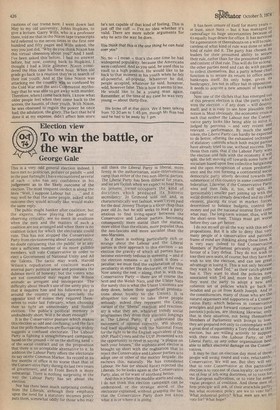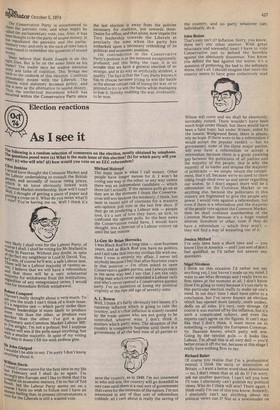Election view
To win the battle, or the war
George Gale
This is a very odd general election indeed. I have met no politician, pollster or pundit — and in the past fortnight I have encountered several of each — who has any confidence in his judgement as to the likely outcome of the election. The most frequent verdict is along the lines "Well, 1 suppose Labour but . . ." and it may well be that the same people, asked what outcome they would actually like, would make the same reply.
The public might hanker after coalition; but the experts, those playing the gam e or observing critically, see no merit in coalition when the men and the matters of such a coalition are not arranged and when there is no coalition ticket for which the electorate could vote. This has not stopped the Conservative Party from electioneering about national unity, no doubt calculating that the public, or at any rate a sufficient number of its more gullible members, will vote Conservative in order to elect a Government of National Unity and All the Talents. The tactic may work. Harold Wilson's repudiation of coalition makes internal party political sense and possesses the dubious merit of honesty; but the voters who are not committed may regard the Wilson attitude as arrogant and intemperate. The difficulty about Heath's use of the unity ploy is that it requires him and his followers to go around the country making precisely the opposite kind of noises they required themselves to make last February, when choosing then to fight an unnecessary and foolish election. The public's political memory is undoubtedly short. Will it be short enough?
It is the Conservative posture which makes this election so odd and confusing; and the fact that the polls themselves are fluctuating widely suggests a confused electorate. The Labour Party is fighting a straightforward campaign, based on the ground — or on the shifting sand — of the social contract and on the proposition that there is no acceptable alternative to it. In addition the Labour Party offers the electorate its say on-the Common Market. Its record in its few months of office is no worse than that of the Conservative Party during its last two years of government, and its Front Bench is more substantial. There is nothing surprising in the way the Labour Party has set about the election.
Nor has there been much surprising coming from the Liberals, although their emphasis upon the need for a statutory incomes policy puts them, somewhat oddly for those who may
still think the Liberal Party is liberal, more firmly in the authoritarian, state-intervention camp than either of the two non-liberal parties. The Liberal Party has been illiberal for years, and we are foolish when we expect to hear from its present owner-occupiers the kind of doctrines which produced its historic ascendancy: Jo Grimond sold out and, in characteristically wet fashion, wasn't even paid for the deal;Jeremy Thorpe is a nicer chap than poor old Jo, but he still seeks to lead a party anxious to find living-space between the Conservative and Labour parties, becoming consequently more statist than the statists, more elitist than the elitists, more populist than the neo-fascists and more socialist than the neo-Marxists.
So if there is nothing particularly rich or strange about the Labour and the Liberal parties in their approach to this election — an election the gravity of which all parties have become extremely tedious in stressing — and if the election remains — as I think it does — peculiar, we must find the explanation of this peculiarity in either the electorate, or the rest. Now among the rest — along, that is, with the Conservative Party — thereare of course the Scot and the Welsh Nats, and the Ulster Nats (for surely this is what the Ulster Unionists are deep down, below their superficial protestations about loyalty to the Union). It is altogether too easy to take these people seriously: indeed they represent the Celtic variant of the "liberal" reaction: and reactionary is what they are, whatever trendy social programmes they dress their atavistic longings in. The Liberal Party, if I understand the movement of opinion correctly, will shortly find itself squabbling with the National Front for the right to be the English equivalent of the SNP, Plaid Cymru and the UU P. Presented with the opportunity to revel in saying "a plague on both your houses," the sophisticated elector is brought up short with the realisation that to reject the Conservative and Labour parties is to adopt one or other of the motley brigade. He eschews this, naturally. He has considered Labour. He has (or should have) rejected the Liberals. So he looks again at the Conservative Party:, alas, or for want of anything better.
And this is where the muddle starts and ends. I do not think this election campaign can be understood, or the strange mood of the electorate explained, without grasping the fact that the Conservative Party does not know what it is or where it is going. It has been unsure of itself for many years — at least, since Suez — but it has managed to camouflage its huge uncertainties because of its equally huge desire for office. It has survived for a generation or thereabouts on a will to rule, careless of what kind of rule was done or what kind of ruler did it. The party has chosen Its leaders for their presumed ability
to secure their rule, rather than for the presumed quality and content of that rule. This will do for so long. the other parties need and can do with pauS,es.. to collect themselves. But a party whose chiet function is to secure its return to office soon bankrupts itself. Its only hope, given Its bankruptcy, lies not in office but in opposition, It needs to acquire a new amount of working capital. Now one of the cliches that has emerged out of this present election is that the party which wins the election — if any does — will destroy itself; and it is easy to see how plausible this notion is. Most obviously, the economic crisis is such that neither the Labour nor the Conservative party looks like being able to solve it. judged by previous — and very recent and relevant — performance. By much the same token, the Liberal Party can hardly be expected to do better, offering the exhausted technique of statutory controls which both major parties have already tried to use, without success. The thesis then runs, that lithe Labour Party wins the election and fails with the economy it will split, the left moving off towards some form of socialism based upon free collective bargaifli and the open recognition of union predomtnance and the rest forming a continental social democratic party utterly devoted towards the submersion of this country in some continental federation. Likewise, if the Conservative Party wins and then fails, it, too, will split, its (presumably) smaller part joining up with the social dembcrats already described and its chief element, placing its trust in market forces, determined to balance budgets, control the money and put the national interest first come what may. The long-term winner, thus, v'ill be the short-term loser. Things must get worse before they can get better. I do not myself go all the way with this set of propositions. But it is idle to deny that verY many people of a conservative and patriotic frame of mind are thinking along these lines. It is very easy indeed to find Conservative Members of Parliament privately arguing 10 favour of a Tory defeat. They do not wish to lose their own seats, of course; but they have no wish to win the election, and can see great advantage in losing it. This is not only because they want to "shed Ted," as their catch-phrase has it. They want to shed the policies noW associated with Ted and, more to the point, they want the party to adopt a new and coherent set of policies which go back to Selsdim and go on from Keith Joseph. And In the constituencies, many of those who are the natural organisers and supporters of a Conservative Party which believes in conservative principles and puts forward conservative (and patriotic) policies, are thinking likewise; onlY that in their situation, not being themselves Members of Parliament with livings to lose, they are prepared not only to contemplate with a great deal of equanimity a Tory defeat at this election, but are willing actively to support with their votes the Labour Party, or the Liberal Party:, or any other organisation best abletoinflict electoral damage on the Conservatives.
It may be that on election day most of these people will swing round and vote, reluctantlY, Conservative. We will see. But they will say that to vote Conservative at this particular election is to vote out of class loyalty; or to vote out of fear of left-wing doctrines; or to vote for the European suffocation; or to vote for some vague prospect of coalition. And these men of firm principle will ask, of their erstwhile party., but what economic policy are we to vote for? What industrial policy? What men are we to vote for? What hope? The Conservative Party is accustomed to claim the patriotic vote, and what might be Failed the parliamentary vote, too. Also, it has has thought to be the party of sound money.. It has repudiated the patriotic and the parhamentary vote; and only in the nick of time has it Come round to remember the questio,n of sound money. Many believe that Keith Joseph is on the right lines. But is he on the same lines as his leader? The leader says he wishes national Lung and talks of coalition. This brings me 'Jack to the oddness of this election. Coalition Presumably means with the Liberals. The Liberals erals want statutory incomes policy; and .11,)Is is seen as the alternative to sound money. Thus, the intellectual movement which has necurred within the Conservative Party since
the last election is away from the policies necessary for coalition, not towards them. Desire for office, and that alone, now impels the Tory leadership towards the Liberals at precisely the time when the party has embarked upon a necessary rethinking of its political and economic position. the contradiction in the Conservative Party's position is at the moment exceptionally profound; and this being the case, it is no wonder that we have a general election of so strange, and in its way so artificially strident, a quality. The fact is that the Tory Party knows it has to choose between trying to win the battle at the almost certain risk of losing the war, or to pretend to try to win the battle while managing to lose it, thereby enabling the war, eventually, to be won. the country, and no party whatever can, individually, do it, John Braine That's easy isn't it? Inflation. Sorry, you know, there isn't any other answer. With great reluctance and sorrowful heart I have to vote Conservative just to defend the horrible against the absolutely disastrous. You know you defend the bad against the worse; it's a question of preferring the bad to the infinitely worse, that's all. I should imagine that since the country seems to have gone collectively mad

































 Previous page
Previous page